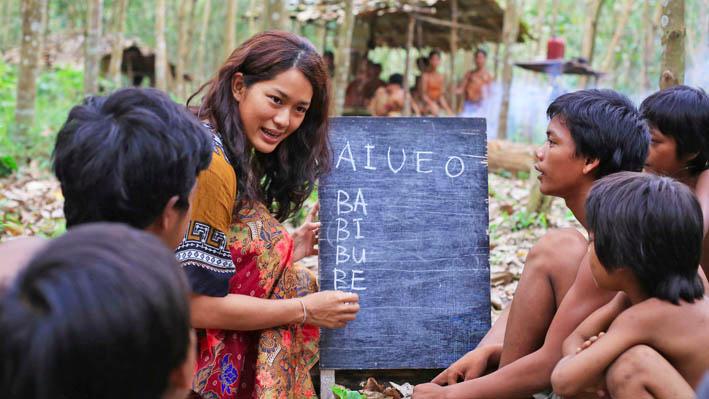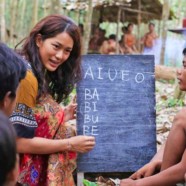Butet Manurung
The word ‘indigenous’ and ‘educated’ do not usually come together in a sentence. Indigenous people are mostly viewed as an anthropological curiosity, an exotic remnant from the bygone era that must be preserved. The excessive zeal to preserve the past, combined with lack of infrastructure, has prevented many remote tribes in Indonesia from receiving education. Thus, they are left powerless and unable to make their contribution as citizens and individuals of the modern world.
But things have started changing.

Prisca Nasution as Butet Manurung, a teacher who has lived with indigenous people in Sumatra for 14 years. (Photo courtesy of Miles Films)
What is SOKOLA?
SOKOLA is an alternative education program designed to suit the needs of remote communities in Indonesia. Butet Manurung founded the school in 2003 and now it has reached out to eight provinces, serving more than 10,000 children as well as adults.
Manurung believes that education for the young generation will bridge the gap between the indigenous communities and the outside world. It will help them protect their interest against corporate and government’s greed. Education empowers them to be active participants in finding solutions to the conflicts over land, forests, and coastlines, which are particularly common in remote areas.
Why indigenous people?
Indigenous people, who inhabit pristine areas with fragile ecosystem, often become the powerless victims of environmental tragedies, both natural and man-made. Their concern in protecting their livelihood sometimes comes in conflict with powerful economic interest; and in such conflicts, they almost always find themselves at the losing end with nowhere to go to make their voices heard.
The government has begun to improve the situation, albeit slowly, by providing access to education. Schools have been set up in remote areas, however, most of them failed miserably as the structure of uniform curricula and block lessons cannot harmonize with the local custom and lifestyle.
How does SOKOLA help?
SOKOLA provides 3 basic stages of education. Manurung and her team are preparing the indigenous people to acquire the skills and knowledge to make informed decision on what is best for their livelihood. They aim to make the young generation to be representatives in meetings with Ministry of Forestry and legislative bodies to defend their community’s rights.
The first stage of SOKOLA’s education consists of basic literacy and numeracy skills, where students are taught how to read, write, and count. The next stage is applied literacy, where students are to use their literacy skills to trade or read contracts. The final stage is advocacy on skills such as how to use public facilities and introduction of modern healthcare to treat diseases. They are also specifically encouraged to know and defend their rights when it comes to illegal logging and zoning plans.
Critical success factors
The secret recipe behind SOKOLA’s success is the selection of teachers. Believing that teachers should be genuinely interested in helping the indigenous people, Manurung is very detailed and meticulous about teacher selection, applying thorough observation when interviewing candidates. During the selection, applicants are shown a film about how the indigenous people live and the questions they raise will let Manurung know where the applicant’s heart lies.
Another critical success factor is the alphabet phonic system Manurung has developed to teach her students. She uses pictorial mnemonics in teaching letters, such as comparing “A” to the roof of a house and “D” to the handle of a kettle. She also uses a pairing system of the alphabets to introduce syllabic patterns to her students.
With SOKOLA, Manurung and her team are changing lives by the thousands in the remotest jungles of Indonesia, producing real indigenous youth leaders who preserve yet bring forward their culture with dignity.
(source: Global Indonesian Voices)
========================================================================
Indonesian Documentary Highlights Tribes Fighting Developers and Conservationists
(source: voanews)

